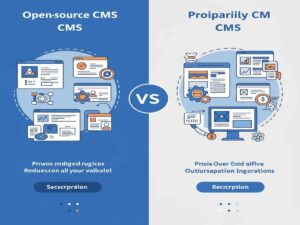How to Choose the Right CMS for Your Website: A Comprehensive Guide

When building or revamping a website, one of the most impactful decisions you’ll make is choosing the right content management system. Your CMS will act as the backbone of your site, enabling you to create, publish, and manage content efficiently while shaping your visitors’ experience.
But with so many platforms available, selecting the ideal system for your unique needs can feel overwhelming. Whether you’re a small business owner seeking ease of use, a marketer focused on SEO capabilities, or a developer in need of customization, finding the right fit is crucial for success.
This guide will break down the essentials of content management platforms, explore key features, compare popular options, and provide actionable steps to help you make an informed decision. By the end, you’ll have the confidence to choose a system that aligns perfectly with your business goals.
What Is a Content Management System (CMS)?
A content management system is software that allows users to create, edit, publish, and manage digital content, typically on a website. Think of it as the control center of your online presence, helping you manage everything from blog posts to e-commerce product listings without needing to write a single line of code.
The core functions of a CMS include:
- Content Creation: Write blog posts, upload images, and manage videos effortlessly.
- Content Editing: Update and optimize existing webpages with user-friendly tools.
- Publishing: Schedule posts, publish announcements, or launch new product pages at the click of a button.
- Management: Organize your content with categories, tags, and version control.
Unlike basic website builders, which cater to simple websites, content management platforms are more robust and customizable. They’re ideal for businesses that need flexibility, scalability, and the ability to manage dynamic content at scale.

Popular Platforms in 2025: Overview and Comparison
To help you make an informed choice, here’s a quick comparison of some of the most popular platforms available today:
|
CMS |
Ease of Use |
Customization |
SEO Capabilities |
Pricing |
Ideal Use Cases |
|
WordPress |
Easy for beginners |
Highly customizable |
Excellent |
Free + plugins/themes cost |
Content-driven websites, blogs |
|
Joomla |
Intermediate |
Good customization |
Strong SEO |
Free + extensions cost |
Community sites, more complex sites |
|
Drupal |
Complex |
Deep customization |
Very strong SEO |
Free + hosting cost |
Enterprise-level websites |
|
Shopify |
Beginner-friendly |
Limited to themes |
Good SEO |
Subscription plans |
E-commerce stores |
|
Wix |
Very easy |
Limited options |
Decent SEO |
Subscription plans |
Small business or portfolio sites |
Highlights of Each CMS:
- WordPress: The most popular CMS globally, known for its flexibility and vast plugin library. Great for websites of all sizes.
- Joomla: Offers more advanced features out of the box, but with a steeper learning curve than WordPress.
- Drupal: Best suited for large, complex websites, but its robustness comes with a higher technical barrier.
- Shopify: Tailored for e-commerce, Shopify makes it easy for businesses to launch and manage online stores.
- Wix: A drag-and-drop builder perfect for simple websites or those just starting out, though it lacks scalability for larger projects.

Key Features to Consider When Choosing a CMS
Every business has unique needs, but there are some features you should always look for when evaluating CMS platforms:
- User-Friendly Interface
Your CMS should be easy to use, even for non-technical users. Look for intuitive dashboards and drag-and-drop editors.
- SEO Tools
A CMS with built-in SEO features like customizable URLs, meta tags, and XML sitemaps ensures your website ranks higher on search engines.
- Customization Options
Ensure the CMS supports plugins or extensions for added functionality and allows you to tweak designs easily.
- Security Features
With cybersecurity threats on the rise, prioritize platforms that offer regular updates, strong encryption, and backup options.
- Scalability
Your business will grow, and your CMS should grow with it. Choose a platform capable of handling increased traffic and content volume.
- E-Commerce Support
If you sell products online, look for CMS platforms with powerful e-commerce features like product catalog management and secure payment gateways.

Open Source CMS vs Proprietary CMS: Which One Is Right for You?
One major decision in your CMS selection process is choosing between open source and proprietary platforms.
Open Source CMS
- Examples: WordPress, Joomla, Drupal
- Pros:
- Free to use.
- Highly customizable with access to source code.
- Active community support.
- Cons:
- Requires technical expertise.
- May require additional investments in hosting and security.
Proprietary CMS
- Examples: Shopify, Wix
- Pros:
- Beginner-friendly and fully hosted.
- Designed for non-technical users.
- Cons:
- Limited customization depending on the provider.
- Monthly subscription fees.
Choose open source if you need flexibility and have technical resources, or go proprietary if ease of use and support are top priorities.

CMS Ease of Use: Why It Matters for Your Business
If you’re not a developer, ease of use is a non-negotiable factor in your CMS choice. A complex CMS can slow down content publishing and hurt productivity.
Key aspects of user-friendly CMS platforms:
- Drag-and-drop editors for quick page building.
- Visual editors to preview content changes in real-time.
- Minimal setup and learning time.
Small businesses and non-technical users benefit immensely from platforms like Wix or Shopify, which are designed with simplicity in mind.
SEO-Friendly CMS: Boost Your Website’s Visibility
Your CMS plays a critical role in your website’s search engine ranking. Here’s what to look for:
- Customizable URLs for better keyword targeting.
- Meta tags management to optimize titles and descriptions.
- Built-in blogging tools to create fresh, SEO-rich content.
- Mobile optimization to improve user experience on all devices.
Platforms like WordPress excel in SEO features, with a wide range of plugins like Yoast SEO to further enhance optimization efforts.
Making Your Final Decision: Step-by-Step Checklist
Here’s a quick checklist to guide your CMS decision:
- Define your website’s purpose and goals.
- Determine your budget and technical resources.
- List the must-have features (e.g., SEO tools, e-commerce support).
- Research platforms and compare their strengths.
- Test demos or free trials before committing.

Choosing the Right CMS Sets Your Website Up for Success
The right CMS can make or break your website’s functionality, growth, and overall user experience. By taking the time to evaluate your needs and compare options, you’ll be one step closer to building a successful online presence.
FAQs
Need Help Choosing the Perfect CMS? Contact Us Today!
Unsure which CMS best meets your needs? Our team of experts can help! We specialize in tailoring recommendations to businesses of all sizes. Contact us today and take the first step toward a website that works as hard as you do.
What is CMS – A Content Management System?
Definition of CMS A Content Management System or CMS is a piece of software that allows you to create, edit and manage digital content on your website. It’s a tool that lets people handle things like blog posts or e-commerce product lists without writing any code.
How can I select the best CMS for my website?
When picking the best CMS for your own website, you’ll want to weigh a variety of factors such as ease of use, customization options, SEO capabilities, and scalability. Consider the goals of your website — if it’s a blog, an e-commerce store, a community platform — and choose a platform accordingly.
Which are the best CMS in 2025?
WordPress, Joomla, Drupal, Shopify, and Wix are among the most popular CMS platforms. Each has its its own strengths (WordPress for content-driven sites, Shopify for e-commerce, Wix for small businesses) — and you can develop your understanding of them by taking an Adobe Tutorial Free Trial here.
What is the difference between open-source and proprietary CMS?
Free open-source CMS platforms, such as WordPress and Joomla,are free as well as very flexible, however they require technical know-how. The proprietary CMS platforms such as Shopify and Wix also offer ease of use and full hosting options but people can have to pay some kind of monthly or annual fee (its minimal), while WordPress is free.
How significant is SEO while selecting a CMS?
SEO is important to increase your website ranking at the search engine. Go for a CMS that has in-built SEO features, like customizable URLs, meta tags, mobile-friendly page templates, as well as the option to add extensions such as Yoast on WordPress.





